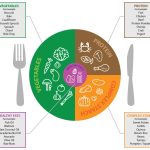Resolution Reboot: Is Your Vegan Diet Working? by Joan Kent, PhD
Let me begin by saying I understand the global need to move away from animal protein in terms of resources and planetary sustainability. I also realize common health issues, such as heart disease, can often be linked to diets high in animal products. And I certainly recognize the issue of animal cruelty. So I’m not writing this to advocate the consumption of meat or other animal products.
Why Does This Topic Matter?
When the need for protein is discussed, most people – including vegans – talk in terms of body protein. Most of the time, that means muscle.
As the thinking goes, if I’m not a body builder and don’t plan to pack on many pounds of large, strong muscle, my dietary need for protein is not that great.
But that view doesn’t consider protein’s effect on health. Glucagon and insulin are two hormones produced by the pancreas. They oppose each other’s functions. As just one of many examples, insulin promotes use of glucose for energy; glucagon promotes use of fat for energy.
Protein foods are the only ones that stimulate glucagon, thus the only foods that help to counteract insulin.
Protein can also boost metabolism by promoting greater calorie burn for its digestion.
The glucagon generated by protein can help to minimize inflammation by reducing insulin’s effect on prostaglandins. For more on inflammation, check out my last article “Resolution Reboot 2023: How Inflammation Affects You.”
Then There’s “Brain Protein”
Protein’s brain effects include beneficial changes in appetite, food preferences, and cravings. Protein has the highest satiety value of any nutrient, curbs the desire for carbs in general, and can help to control, even eliminate, cravings for junky foods like sugar.
Brain protein is key in work productivity and mental focus – and not just when you’re at your desk. For several years, I coached an athletic training program that included indoor rowing. It was easy to spot vegans in the program. During the rowing workouts, it was obvious when they were losing focus.
I wasn’t the only coach who noticed this. The man who created the program told me one day about a participant who “couldn’t focus for longer than” …. I knew what he was going to say before he finished his sentence …. “30 seconds.”
My solution for vegan participants in my group included suggesting they have whatever protein they were willing to eat – fish, or shrimp, or Greek yogurt with 20 grams of protein per serving. Those who tried it saw their focus improve dramatically.
Brain protein can also help alleviate anxiety, depression, mood swings, even ADD and ADHD.
Finally, We Have Women and Serotonin
Women’s protein needs have historically been under-estimated, no doubt due to women’s smaller muscle mass compared with men’s. This oversight, only recently acknowledged, was based on thinking of protein as a muscle food.
Yet the female brain has a higher rate of serotonin turnover than the male brain. Serotonin is made by the brain from tryptophan, an amino acid. As you no doubt recall from 7th grade biology (!!), amino acids are the “building blocks of protein.” Without adequate protein to supply tryptophan throughout the day, it can be difficult for women to get adequate serotonin.
This may partially explain the higher incidence of depression among women. Women themselves may contribute to this by eating in a way that shows a “body protein” bias toward protein foods.
So Regarding the Above Topics, What Can We Say?
I once received notification about an online discussion: Are Vegans More Evolved?
Well, if we look at global awareness and concern for the environment and animal welfare, we might conclude that vegans are more evolved.
In terms of understanding protein’s importance in health, mood, and brain, not just body and muscle, we might conclude that vegans may have overlooked some key points.
In terms of vegan “protein” selections, though, I’m afraid I’d have to say vegans may miss the mark. Foods that vegans claim are protein foods are often not.
As one example – and a big one – look at nuts. Nuts are primarily fats, with only a little carbohydrate and even less protein. Seriously.
Quinoa and beans, often touted as high-protein foods, are primarily carbohydrate (starch).
It’s not as if these foods have NO protein: most foods contain a combination of protein, fat, and carbohydrate. But they don’t have enough to be called protein foods, and they may not be able to trigger the brain/mood changes that true protein foods can.
Based on this, I offer a Vegan Protein Solution: plant-based protein powder. There are many from which to choose: hemp, pea, brown rice, vegetable (wide variety). I’ve used this option myself when traveling to seminars where I know the cuisine will be vegan. I take envelopes of protein powder with me, put the contents into a glass, fill it with water, and drink it. With my protein needs met, I can enjoy the vegan meal.
If you’d like help with your protein needs – for health, weight loss, mood, focus, anything else, just visit LastResortNutrition.com and grab your free Boost My Brain consult. Discover how small changes can deliver big results!
Brought to you by Dr. Joan Kent, best-selling author of Stronger Than Sugar.



